Vulture Capitalism Corporate Crimes, Backdoor Bailouts and the Death of Freedom
Grace , Aaron and a rude interuption from the excluded middle.
https://www.bloomsbury.com/uk/vulture-capitalism-9781526638076/
The video discusses how capitalism limits freedom by promoting individualism, dividing society into rulers and the ruled, and fostering a belief that we are powerless within the complex economic system. It challenges the binary between socialist economies and free market economies, arguing that capitalism has always involved a fusion of public and private power. The conversation also touches on the role of management in organizations and the question of whether socialism can address the problems highlighted.
Detailed Summary for [How Capitalism Makes You LESS Free | Grace Blakeley Meets Aaron Bastani]() by [Monica](https://monica.im)
[00:00]() Individualism hampers our ability to organize collectively and project political agency onto others, leading to a sense of powerlessness within the complex economic system, which contradicts the notion of living in a free market system.
- Society is divided into rulers and the rest.
- People on the right often rely on someone else, like Donald Trump, to save them.
- Belief in powerlessness within the economic system affects people's ability to demand change.
- The dichotomy between socialist economies and free market economies may not be accurate.
[08:40]() The concept of free market capitalism has its roots in the legacy of the Cold War and the debate between rational centralized planning and individual freedom.
- The Cold War helped construct an ideological divide between centralized planning and free market systems.
- The debate between Keynesians and Hayekians further reinforced this divide within democracies.
- Hayek argued that any level of centralized planning leads to a loss of individual freedom and is akin to the Soviet system.
[17:21]() Boeing executives knew about a technical problem with the manufacturing of their planes that caused them to crash, and the FAA, which was supposed to regulate Boeing, failed to do so effectively.
- Boeing executives were charged with a criminal conspiracy to cover up the problem with their planes.
- The FAA, responsible for regulating Boeing, was subject to self-regulation and failed to act objectively.
- Whistleblowers were ignored until major crises occurred.
- Boeing received massive bailouts during the pandemic and was already one of the biggest recipients of corporate welfare in the US.
[26:02]() The speaker argues that the fusion of public and private power has been a central part of capitalism throughout history, and uses the example of Ford Motor Company to illustrate this.
- The neoliberal revolution in the 1980s is seen as a turning point, but the speaker believes that the fusion of planning and market discipline has always characterized capitalist systems.
- The Ford Motor Company is used as an example of a company that emerged during a period of less government intervention in the economy, survived through the Keynesian revolution, and continues to exist in the neoliberal period.
- By studying the development of Ford, one can observe how planning has evolved and how the fusion of public and private power has changed over time.
Raised an “Anti-Semitism” and Calls a Muscle Shoals
Henry Fords Anti Gold Standard Stance
It is not to make money, or, primarily, to stimulate the employment of a million men now idle, or to make the South an industrial center. His purpose, he said, is to end all wars forever.
Henry Ford, by building the world’s greatest power plant here on the Tennessee River, expects to eliminate gold as the basis of world wealth and substitute for it something different — the units of power. And by doing this, he said, war would cease, for gold is the cause of war. “It’s very simple when you analyze it,” said Mr. Ford, “the cause of all war is gold. We shall demonstrate to the world two things, first, the practicability, second, the desirability of displacing gold as the basis of currency and substituting in its place the world’s imperishable natural wealth. “Almost everybody in the world except the newspapers and the bankers recognizes that civilization has entered on a new era.
The newspapers don’t see it and the international banker — don’t want to see it — it would mean changes in world finance and bankers always oppose changes. “There is a group of international bankers who today control the bulk of the world’s gold supply. No matter to what country they as individuals claim allegiance, they all play the same game
to keep the gold they have in their own hands and to get just as much more as possible.
“no true Scotsman would do such a thing”; i.e., those who perform that action are not part of our group and thus criticism of that action is not criticism of the group).[3]
[34:43]() In the neoliberal period, decision-making power is returned solely to capitalists and their allies within the state, cutting workers out of the planning process and disempowering them.
- The state does what capitalists say, leaving workers out of the planning process.
- Capital mobility allows businesses to threaten leaving if workers don't comply.
- Power to plan is restored to capitalists and their allies within the state, while workers lose their seats at the bargaining table.
[43:25]() The breakdown of the signal system is the main reason for train delays in the country.
- BAE Systems, the company with the most engineers, could fix the signal system quickly.
- The speed at which the COVID vaccine was developed shows that necessity drives problem-solving.
- Social value is not prioritized over shareholder value.
- Different professions have different problem-solving capabilities.
[01:00:46] Unfreedom is the lack of freedom to do something, and capitalism creates constraints on both narrow and wider definitions of freedom.
- Freedom is often presented as either being able to do something or not, but there are many constraints on our autonomy enforced by the state.
- Capitalism creates a wider understanding of freedom where people feel disempowered due to problems and issues that seem beyond their control.
- Examples of constraints include high rent and having to work in hierarchical organizations controlled by AI.
1. The concept of centralized planning within capitalist societies challenges the traditional dichotomy between free market capitalism and centrally planned socialist systems. This challenges the notion of a purely free market system and highlights the significant role of planning in capitalist economies.
2. The fusion of public and private power in service of vested interests at the top of society undermines the idea of a purely free market system. This fusion results in a lack of democratic accountability and a concentration of economic power among the wealthiest and most powerful individuals and entities.
3. The example of Boeing illustrates the intimate relationship between large corporations and the state, challenging the notion of purely market-driven decision-making. The influence of corporations on regulatory agencies and the extent to which they can extract corporate welfare from the government highlights the intertwining of public and private power in shaping economic outcomes.
4. The shift in planning dynamics post-World War II demonstrates a change in decision-making power, rather than a reduction in the size or power of the state. This shift excludes workers from the planning process, restoring decision-making power solely to capitalists and their allies within the state.
5. The case of Ford Motor Company exemplifies the evolving nature of planning within capitalist economies. From the unimpeded power of individual capitalists to the corporatist model and subsequent exclusion of workers from planning decisions, it highlights the shifting dynamics of decision-making power over time.
6. The narrative challenges the traditional understanding of capitalism as a purely free market system and emphasizes the complexities of planning, power dynamics, and decision-making processes within capitalist societies. It calls for a reevaluation of the role of planning and the fusion of public and private power in shaping economic outcomes.
1. The text discusses the concept of freedom and unfreedom, highlighting the impact of institutional constraints on individual autonomy.
2. It delves into the role of democratic decision-making in addressing societal issues and empowering individuals.
3. The conversation touches on the potential implications of policy outcomes on different segments of the population, emphasizing the importance of inclusive dialogue and participatory governance.
4. The overall tone reflects a nuanced consideration of complex socio-political dynamics and a hopeful outlook for the future based on the potential of collective action and empowerment.
Anti-War Mothers – Celebrating Mother’s Day in the US
VN Alexander
I refuse to raise my child to grow up to kill another mother’s child.
Julia Ward Howe, founder of Mother’s Day, 1870Originally conceived as a protest to war, Mother’s Day – celebrated in the US on the second Sunday of May – has become a marketing tool to boost consumer spending to give suck to Amazon and FTD florists.
So What Do We Do Now?
By the time peasants, Blacks and women all finally got the vote, practically everyone was already locked in a paternalistic power structure in which a few people at the top made decisions for everybody about economics, health, and culture.
The Best Known Anecdote About Stańczyk and the Allegory Against Poking the Russian Bear
The best known anecdote about Stańczyk is that of a hunting incident. In 1533 King Sigismund the Old had a huge bear brought for him from Lithuania. The bear was released in the forest of Niepołomice near Kraków so that the king could hunt it. During the hunt, the animal charged at the king, the queen and their courtiers which caused panic and mayhem. Queen Bona fell from her horse which resulted in her miscarriage. Later, the king criticized Stańczyk for having run away instead of attacking the bear. The jester is said to have replied that “it is a greater folly to let out a bear that was already in a cage”. This remark is often interpreted as an allusion to the king’s policy toward Prussia which was defeated by Poland but not fully incorporated into the Crown.
The anecdote serves as a reminder of Stańczyk’s astuteness and his ability to use humor to convey profound messages. It also sheds light on the complexities of political dynamics during that period, where seemingly trivial incidents held deeper symbolic meanings.
This metaphorical representation signifies a cautionary approach towards provoking or instigating conflict with Russia, often symbolized by the bear in political contexts. The painting encapsulates the idea that inciting or engaging in confrontations with powerful entities can lead to detrimental consequences, much like the hunting incident involving the bear in Stańczyk’s anecdote.
Shopenhauer by way of example suggests the Vicar of Wakefiels as an example of Claiming a winning point in argument whilst perhaps being rather full of bluster? ( Art of Being right Stratagem XXXVI )
But since present examples are odious, we may refer to The Vicar of Wakefield for an old one.
I would have all men kings. I would be a king myself. We have all naturally an equal right to the throne: we are all originally equal.
The generality of mankind … have unanimously created one king, whose election at once diminishes the number of tyrants, and puts tyranny at the greatest distance from the greatest number of people. Now the great who were tyrants themselves before the election of one tyrant, are naturally averse to a power raised over them … It is the interest of the great, therefore, to diminish kingly power as much as possible; because whatever they take from that, is naturally restored to themselves; and all they have to do in the state is to undermine the single tyrant, by which they resume their primeval authority.
He goes on to say that this undermining, this ambition, is facilitated by the accumulation of wealth, and that the state is set up in such a way as to concentrate wealth in the hands of a few at the expense of the many, and power solely in the hands of the wealthy at the expense of the qualified.
War as the Health of the State
The phrase "War is the health of the state" encapsulates the notion that during times of conflict or war, governments and ruling powers tend to consolidate their control and authority. This concept, often attributed to political theorist Randolph Bourne, highlights how war can serve as a catalyst for strengthening state power and centralizing governance. It underscores the idea that in times of crisis or external threats, governments often seek to expand their influence and control over their populace.
All Wars Are Bankers' Wars
The assertion that "All wars are bankers' wars" reflects a perspective that views financial interests and banking institutions as influential factors in instigating or perpetuating conflicts. This viewpoint suggests that behind many geopolitical and military engagements, there are underlying economic motives driven by powerful financial entities. It implies that wars are often fueled by economic agendas and financial gains, with banking institutions playing a significant role in shaping global conflicts.
The Battle of the Sexes and Class War
Drawing a distinction between the battle of the sexes and class war, it is essential to recognize that the former pertains to gender dynamics and societal power struggles based on gender roles, while the latter encompasses broader socio-economic disparities and struggles between different social classes. The battle of the sexes revolves around issues of gender equality, representation, and rights, whereas class war delves into systemic inequalities, exploitation, and power differentials between social and economic classes.
The Predatory Power Elite and Their Impact
The predatory power elite refers to a segment of society comprising influential individuals or groups who wield significant control over societal structures, resources, and governance. This elite class holds considerable power and influence, often at the expense of others within society, including themselves. Their actions and decisions can have far-reaching implications on various aspects of social, economic, and political domains.
The Oppressors' Perception of Monopoly on Having More
The oppressors, often part of the predatory power elite, tend to view their accumulation of wealth and resources as a privilege rather than recognizing it as a means of dehumanizing others and themselves. This perception blinds them to the inherent dehumanizing effects of their pursuit of possessing more at the expense of others. Their relentless pursuit of material possessions leads to a suffocation within their own wealth, resulting in an existential void where they lose sight of their intrinsic humanity.
Paulo Freire's Perspective on Education and Liberation
Paulo Freire, a renowned Brazilian educator and philosopher, emphasized the transformative power of education as a means of achieving liberation from oppressive systems. His influential work focused on critical pedagogy and the importance of conscientization, which involves raising awareness about social injustices and fostering critical thinking among marginalized communities. Freire's approach aimed to empower individuals to challenge oppressive structures and advocate for social change through education and dialogue.
Women of America for Peace - Advocacy for Peaceful Solutions
The Women of America for Peace movement represents a collective effort by women across the United States to advocate for peaceful resolutions to conflicts and promote non-violent approaches to addressing global challenges. This movement underscores the pivotal role of women in promoting peacebuilding efforts and nurturing inclusive dialogue aimed at mitigating tensions and fostering understanding among diverse communities. By amplifying women's voices in advocating for peaceful solutions, this movement contributes to shaping a more harmonious and equitable world.
Global Wars, Public Debts, and Long Cycle Theory
The study by Karen A. Rasler and William R. Thompson delves into the intricate relationship between global wars, public debts, and long cycles within the world system's leading powers. It highlights how uneven economic development often overlooks the significant role played by public credit creation and management in shaping historical power dynamics. The study emphasizes how competitive financial capabilities influenced victories of nations such as the Netherlands and Great Britain over larger states like Spain and France prior to 1815. Furthermore, it underscores how postwar reductions in governmental expenditures following victories led to higher absolute debt burdens. The study provides valuable insights into how world leaders' decisions have contributed to shifts in preponderant capability positions within international relations.
Unmasking Secret Power - The Lost Science of Money
The exploration of secret power unmasked revolves around unveiling hidden forces wielded by those controlling society's monetary reins. It sheds light on deceptive ideologies surrounding money and exposes immoral use of economic theory as a tool for class warfare over several centuries. The narrative underscores how certain special interests have manipulated society's monetary system through obscure theories about money, leading to control over societal structures. By presenting historical cases with illustrations, this exploration aims to convey vital messages about protecting individuals, families, nations, and humanity from predatory forces operating under deceptive economic guises.
Summary of Monetary History - From Ancient Oriental Systems to Coinage
The summary of monetary history traces the evolution of money from ancient Oriental systems to coinage-based economies. It emphasizes how money's existence is not inherent but rather established by law or binding custom, as articulated by Aristotle. The narrative delves into early urban communities in Egypt, Assyria, and Sumeria following the Ancient Oriental System's social and economic organization. It highlights the role of powerful royal households and temple hierarchies in centralized control over economies, utilizing agricultural commodities by weight as primitive money systems. Furthermore, it explores coinage as a compromise between abstract fiat money forms and materialistic metal by weight systems, shedding light on its advantages over bullion in terms of uniformity and controlled quantity.
Challenges with Coinage Systems - Usury Error and Monetary Reforms
The exploration delves into challenges associated with coinage systems, particularly regarding usury errors prevalent in ancient agrarian societies. It elucidates how loans made in seed grains, animals, or tools were repaid with interest in kind based on harvest yields or animal reproduction. This system led to severe difficulties when transitioning to coinage-based economies due to usury practices impacting farmers' ability to repay loans effectively. The narrative underscores pivotal monetary reforms introduced by figures such as Solon in Athens to alleviate usury errors through minimum monetary equivalents for agricultural products. Additionally, it sheds light on Rome's transition from a fiat money system to commodity-based coinage under political pressures during wars with Carthage.
Impact of Rome's Commodity Money System - Monetary Drain and Eastern Cults
The narrative explores Rome's shift towards commodity money systems based on gold and silver during conflicts with Carthage, leading to detrimental consequences such as monetary drains from trade with India. This transition marked Rome's loss of monetary independence as precious metals were depleted due to trade imbalances. Furthermore, it shed light on how Rome's gold standard contributed to her vulnerability to external influences from eastern cultures and religious practices.
Conclusion
In conclusion, these diverse themes encompass historical anecdotes, socio-economic perspectives, monetary explorations, and geopolitical analyses that shed light on intricate power dynamics shaping human societies throughout history. From allegorical representations to critical examinations of monetary systems, these narratives offer valuable insights into societal structures, power struggles, financial influences, and transformative movements advocating for peace and liberation. By delving into these multifaceted realms, we gain a deeper understanding of historical complexities and contemporary socio-political landscapes that continue to shape our world today.
“Bring then above all ignorance, to which add confidence, audacity, and effrontery; as for diffidence, equity, moderation, and shame, you will please leave them at home; they are not merely needless,
“Bring then above all ignorance, to which add confidence, audacity, and effrontery; as for diffidence, equity, moderation, and shame, you will please leave them at home; they are not merely needless, they are encumbrances.´´ Lucian. Rhetoriticians Vade Vecum.
QED Post Climate Change, Land Use and Monetary Policy, The New Trifecta.
Doubling Back I often find it somewhat more productive than doubling down. Doubling Down is a form of denial and Doubling Back is a retracing of steps to find where one took a misstep. Whilst the end of the World is not nigh, the end of the current monetary arrangements is nigh, and also the old social contract is up in flames and withering away as I type…
Notes for a Poem or some prose. Globalisation, A big Question?
ROGERGLEWIS MARCH 12, 2017 3 COMMENTS
VII. — FEDERATION
The New World Order
by
H.G. Wells
There is one direction in which Mr Streit’s proposals are open to improvement. Let us turn to another in which he does not seem to have realised all the implications of his proposal. This great Union is to have a union money and a union customs-free economy. What follows upon that? More I think than he realises.
There is one aspect of money to which the majority of those that discuss it seem to be incurably blind. You cannot have a theory of money or any plan about money by itself in the air. Money is not a thing in itself; it is a working part of an economic system. Money varies in its nature with the laws and ideas of property in a community. As a community moves towards collectivism and communism, for example, money simplifies out. Money is a necessary in a communism as it is in any other system, but its function therein is at its simplest. Payment in kind to the worker gives him no freedom of choice among the goods the community produces. Money does. Money becomes the incentive that “works the worker” and nothing more. Ed. NB
But directly you allow individuals not only to obtain goods for consumption, but also to obtain credit to produce material for types of production outside the staple productions of the state, the question of credit and debt arises and money becomes more complicated.
Not Counting Niggers George Orwell
Here and there in the book, though not often, there are references to the ‘dependencies’ of the democratic states. ‘Dependencies’ means subject races. It is explained that they are to go on being dependencies, that their resources are to be pooled among the states of the Union, and that their coloured inhabitants will lack the right to vote in Union affairs. Except where the tables of statistics bring it out, one would never for a moment guess what numbers of human beings are involved. India, for instance, which contains more inhabitants than the whole of the ‘fifteen democracies’ put together, gets just a page and a half in Mr Streit's book, and that merely to explain that as India is not yet fit for self-government the status quo must continue. And here one begins to see what would really be happening if Mr Streit's scheme were put into operation. The British and French empires, with their six hundred million disenfranchised human beings, would simply be receiving fresh police forces; the huge strength of the USA would be behind the robbery of India and Africa. Mr Streit is letting cats out of bags, but all phrases like ‘Peace Bloc’, ‘Peace Front’, etc contain some such implication; all imply a tightening-up of the existing structure. The unspoken clause is always ‘not counting niggers’. How can we make a ‘firm stand’ against Hitler if we are simultaneously weakening ourselves at home? In other words, how can we ‘fight Fascism’ except by bolstering up a far vaster injustice?
For of course it is vaster. What we always forget is that the overwhelming bulk of the British proletariat does not live in Britain, but in Asia and Africa. It is not in Hitler's power, for instance, to make a penny an hour a normal industrial wage; it is perfectly normal in India, and we are at great pains to keep it so. One gets some idea of the real relationship of England and India when one reflects that the per capita annual income in England is something over £80, and in India about £7. It is quite common for an Indian coolie's leg to be thinner than the average Englishman's arm. And there is nothing racial in this, for well-fed members of the same races are of normal physique; it is due to simple starvation. This is the system which we all live on and which we denounce when there seems to be no danger of its being altered. Of late, however, it has become the first duty of a ‘good anti-Fascist’ to lie about it and help to keep it in being.
What real settlement, of the slightest value, can there be along these lines? What meaning would there be, even if it were successful, in bringing down Hitler's system in order to stabilize something that is far bigger and in its different way just as bad?
But apparently, for lack of any real opposition, this is going to be our objective. Mr Streit's ingenious ideas will not be put into operation, but something resembling the ‘Peace Bloc’ proposals probably will. The British and Russian governments are still haggling, stalling and uttering muffled threats to change sides, but circumstances will probably drive them together. And what then? No doubt the alliance will stave off war for a year or two. Then Hitler's move will be to feel for a weak spot or an unguarded moment; then our move will be more armaments, more militarization, more propaganda, more war-mindedness — and so on, at increasing speed. It is doubtful whether prolonged war-preparation is morally any better than war itself; there are even reasons for thinking that it may be slightly worse. Only two or three years of it, and we may sink almost unresisting into some local variant of austro-Fascism. And perhaps a year or two later, in reaction against this, there will appear something we have never had in England yet — a real Fascist movement. And because it will have the guts to speak plainly it will gather into its ranks the very people who ought to be opposing it.
Orwell summarises Burnham’s ideas in The Managerial Revolution and The Machiavellians and highlights inconsistencies. He believed Burnham was fascinated by power and was sympathetic to Nazi Germany while they appeared to be winning, but by 1944 had transferred his sympathy to the USSR. He noted, however, that the theme of a new (and probably servile) society—neither capitalist nor socialist—was predicted in many works such as Belloc’s The Servile State, and dystopian novels such as Wells’ The Sleeper Awakes, Zamyatin’s We and Huxley’s Brave New World.
#GRUBSTREETJOURNAL #ORWELL #ERICBLAIR #JAMESBURNHAM #MIGHTISRIGHT (SIC)
SECOND THOUGHTS ON JAMES BURNHAM
Capitalism is disappearing, but Socialism is not replacing it. What is now arising is a new kind of planned, centralised society which will be neither capitalist nor, in any accepted sense of the word, democratic. The rulers of this new society will be the people who effectively control the means of production: that is, business executives, technicians, bureaucrats and soldiers, lumped together by Burnham, under the name of ‘managers’. These people will eliminate the old capitalist class, crush the working class, and so organise society that all power and economic privilege remain in their own hands. Private property rights will be abolished, but common ownership will not be established. The new ‘managerial’ societies will not consist of a patchwork of small, independent states, but of great super-states grouped round the main industrial centres in Europe, Asia, and America. These super-states will fight among themselves for possession of the remaining uncaptured portions of the earth, but will probably be unable to conquer one another completely. Internally, each society will be hierarchical, with an aristocracy of talent at the top and a mass of semi-slaves at the bottom.
THE THEORY AND PRACTICE OF OLIGARCHICAL COLLECTIVISM BY EMMANUEL GOLDSTEIN.
·
FEB 13
END OF OWNERSHIP, CIRCULAR ECONOMY PROOF OF BRAIN AND PRIMARY, INTERMEDIARY AND CONSUMPTION ENERGY TOKENS. A FRAMEWORK EVOLVES.
If one just accepts that there is nothing to redeem the existing Finance System getting on with rebasing money to either Joules or KWH equivalents in the three categories of Primary Intermediary and consumption and noting the Hoarding aspects of energy in long-term capital assets and applying something akin to the single land tax on them, we really can get somewhere near to a sustainable Birth Right economy. Where it gets very interesting is in the Information economy where shared knowledge doubles the knowledge it does not half it. Richard Stallman (GNU) often makes that very point.
To satisfy the need for Status in the Social Animal humankind ( see Pigou Dalton Principle for a Theoretical framework for Taxation boundary conditions. ) Anyhow it is in the space of non-monetised social interactions where the second sort of discretionary token can be created on a blockchain providing the necessary ornament and display trinkets that determine the mating game? I will not elaborate here but Forres / Lagom the community system I have been working on has the idea that it is Mineable or winnable or giftable, The Distributed computing platform Steemit has something called proof of Brain which is a species of the sort of online social success measure which can easily be monetised to provide a competitive element to the Production of both the Birth Right token and the Discretionary speculative mating game side of the sustainable circular economy.
Click============>QED On the Going Direct Mind Map<==========kcilC
July 16, 2019
HALF THE WORLD'S METALLIC MONEY DESTROYED Alexander Del Mar, estimated that the silver demonetizations cut Europe's money supply in half: "Mr. Carlisle (later Secretary of the Treasury, 1893-97) said in the House of Representatives, February 2 ISt, 1878, 'The conspiracy which seems to have been formed here and in Europe to destroy by legislation and otherwise, from three-sevenths to one-half of the metallic money of the world, is the most gigantic crime of this or any other age.", 19TH CENTURY MONETARY CRIMES-THE GREAT DEFLATIONS p.485 Zarlega Lost Science of money
The carbon currency end game unfolds as a confluence of economic Myths Directed by a no longer invisible hand seeks to bring in a techno Feudal surveillance state.
·
JAN 7
QED
https://web.archive.org/web/sitemap/https://notthegrubstreetjournal.com
Land Use and Monetary Policy, The New Trifecta. This Book is highly recommended.
Flu d’état, Part 2. Central Bank Coup Det Tat. The Central Bank Balance Sheet Pandemic. OCTOBER 3, 2021 #Covidstroika ITS A DIGITAL BANK PASSPORT NOT A VACCINE PASSPORT #QED.
“a state of semi-permanent health emergency is preferable to a vertical market crash that would turn the memory of 2008 into a walk in the park.” September 17th 20019 #RepoSpike #GoingDirect
AUTHOR:ROGERGLEWIS PUBLISHED DATE:JANUARY 13, 2022
This is an excellent article and analysis. The driving motivation behind the accelerated rush to a Techno Fascist Feudalism has been occupying my mind for the years leading up to the Repo Spike in New York in September 2019.
In the Financialised economy and with the CBDC push tied to Digital IDs, we see a symptom of the appearance of what the system is trying to preserve, namely itself and its Monopoly ingroup. The real economy is put in the position of trying to make bricks without straw, a misallocation of resources, and the Credit tokens to acquire those resources.
The Dominant Resource that ties the Financial system’s real potential to the Real potential of the real economy is the Flow of Energy resources and Primary resources through the economy. It would seem that a Hard limit on available energy to sustain the present industrial output of the global economy has been hit ( Not due to peak oil or even peak cheap peak oil but to Peak disinvestment in Hydro Carbons)*, what seems inexplicable is the Priorities touted in narratives regarding Why our largest Energy Sources the Hydro Carbons, Gas, Oil, and Coal, and the largest potential replacement for them Nuclear are being demonised?
*, Link added to Going Direct Mind Map ED.
AUTHOR:ROGERGLEWIS PUBLISHED DATE:MARCH 15, 2023
‘
https://longhairedmusings.wordpress.com/?s=QED
August 8 2022.
when-the-crisis-hit-the-fanor-now-that-the-guano-is-hitting-the-ventaxia-again
August 7 2022
aadhaar-trailer-censored-world-wide-english-subtitles
August 6 2022
biden-and-the-u-s-israel-gcc-axis-its-not-the-oil-its-the-money
Central Bank Coup Det Tat. The Central Bank Balance Sheet Pandemic. #Covidstroika ITS A DIGITAL BANK PASSPORT NOT A VACCINE PASSPORT #QED. @NAOMIRWOLF @financialeyes @JoeBlob20 @Pathos14658352 @DavidGolemXIV
AUTHOR:ROGERGLEWIS PUBLISHED DATE:OCTOBER 3, 2021
https://drive.google.com/file/d/1sYJ4CFfKtqGFOoWPWjIDHIaONXNnCpI7/view?usp=sharing
(ED, arch 2023, ISSU embed replaced with cloud document , ISSU account now closed.)
Central Bank Coup Det Tat. The Central Bank Balance Sheet Pandemic.
UK Banks and Bank of England Balance Sheet Ratio
2010 350,000,000,000 central bank 4,000,000,000,000 banks 8.75%
2016 400,000,000,000 CB 3,400,000,000,000 banks 11.76%
September 2021 1,000,000,000,000 cb 4,200,000,000,000 banks 23.81%
us Fed 2008 balance sheet 1 Trillion 2021 8 Trillion
Us Private banks balance sheet 2008 10 Trillion 2021 22trillion
from 10% to 33% from 1/10th to 1/3rd
Conclusion Princes of The Yen.
With the end of the Cold War, traditional politicians have lost out to
central bankers as the driving force in the world. Central bank decisions
can open the floodgates for capital flows to pour into one market and out
of another, redenominating prices, quantities, and currencies. As the
movement to strengthen the independence of central banks has gained
momentum, the discreet individuals in dark suits, who are not known for
verbosity, have become the de facto rulers over economies, countries, and
regions. They create booms, busts, and crises; they reflate and deflate,
appreciate and devalue, affecting the daily lives of millions of people.
References:
Global Wars, Public Debts, and the Long Cycle
Karen A. Rasler (a1) and William R. Thompson (a2)
http://conquestofdough.weebly.com/the-conquest-of-dough.html
The Lost Science Of Money; The Mythology Of Money And Story Of Power ( 2002) - Stephen Zarlenga
https://grubstreetinexile.substack.com/p/qed-post-climate-change-land-use-686
Vulture Capitalism Corporate Crimes, Backdoor Bailouts and the Death of Freedom
https://www.bloomsbury.com/uk/vulture-capitalism-9781526638076/
Hi Ranjan, It would be good to do a chat on Grace’s interview about her book, I don't really have time to read it but the argument she makes to Aaron strikes me as being lacking in Causes , The Causes of Capitalism? The Causes of Money? Aaron comes across as a bit wet to be honest he talks about Capitalism inventing the Moderna Vaccine to save us from the Pandemic? blimey , also managerialism his question on that is interesting I suggest he reads orwells second thoughts on Mr Burnham. etc. Grace I think is in a different camp I wonder if she has read Kropotkins Mutual Aid and the Conquest of Bread , perhaps not she has never mentioned Bakunin in anything I have heard her say, niot that thats saying much. Anyway maybe you could get Grace4 to join us for a chat If she agreed I would make time to study her book properly.
https://longhairedmusings.wordpress.com/?s=bastiat+prouhdon





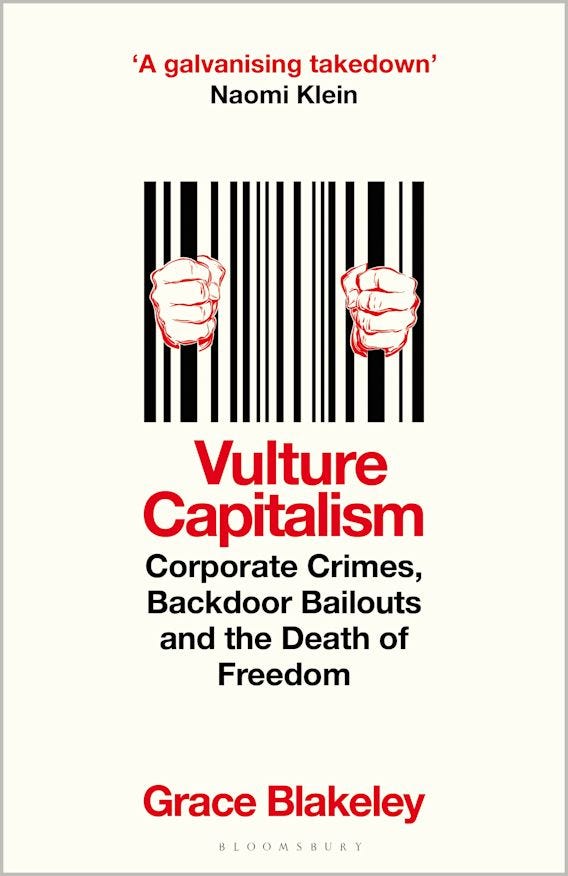





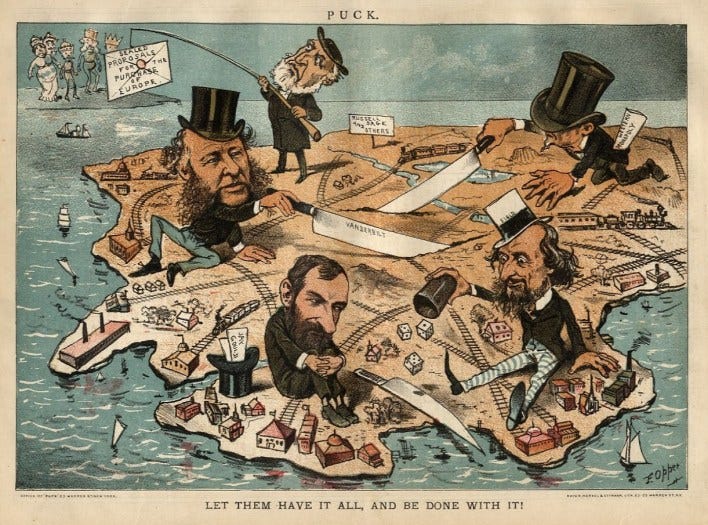

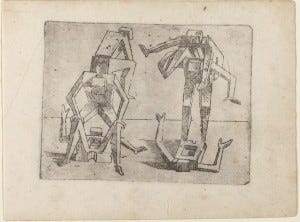

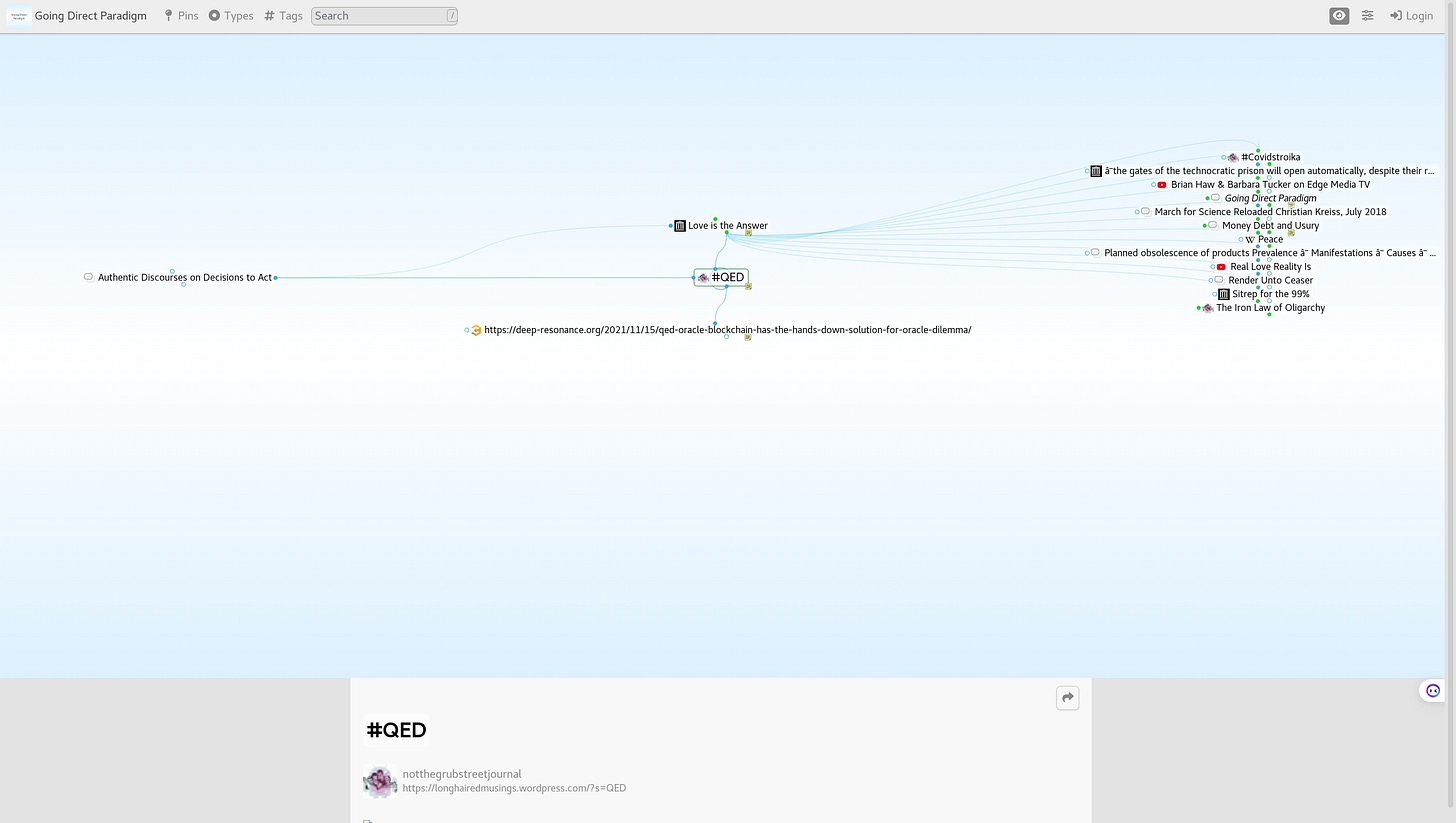

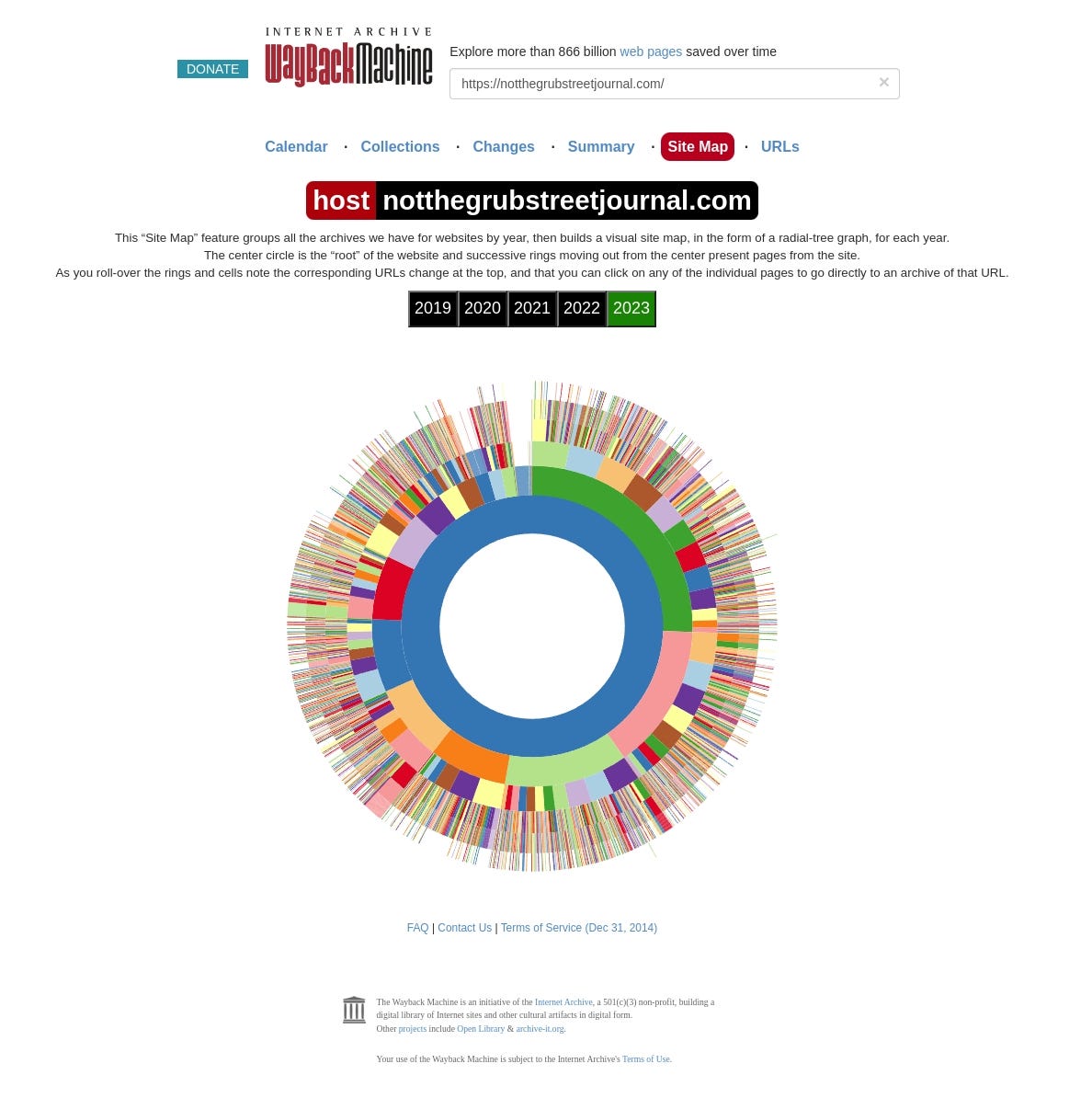
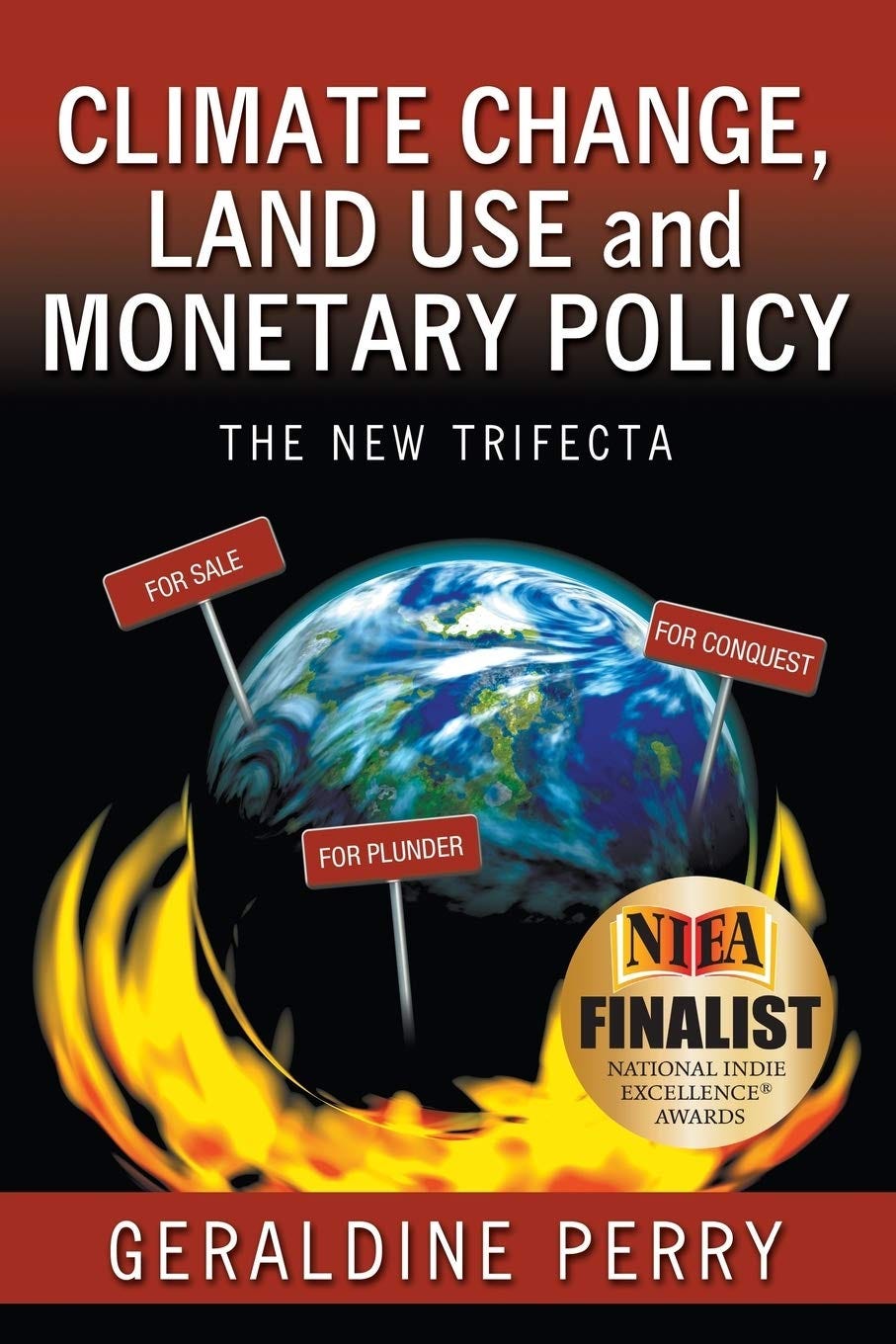
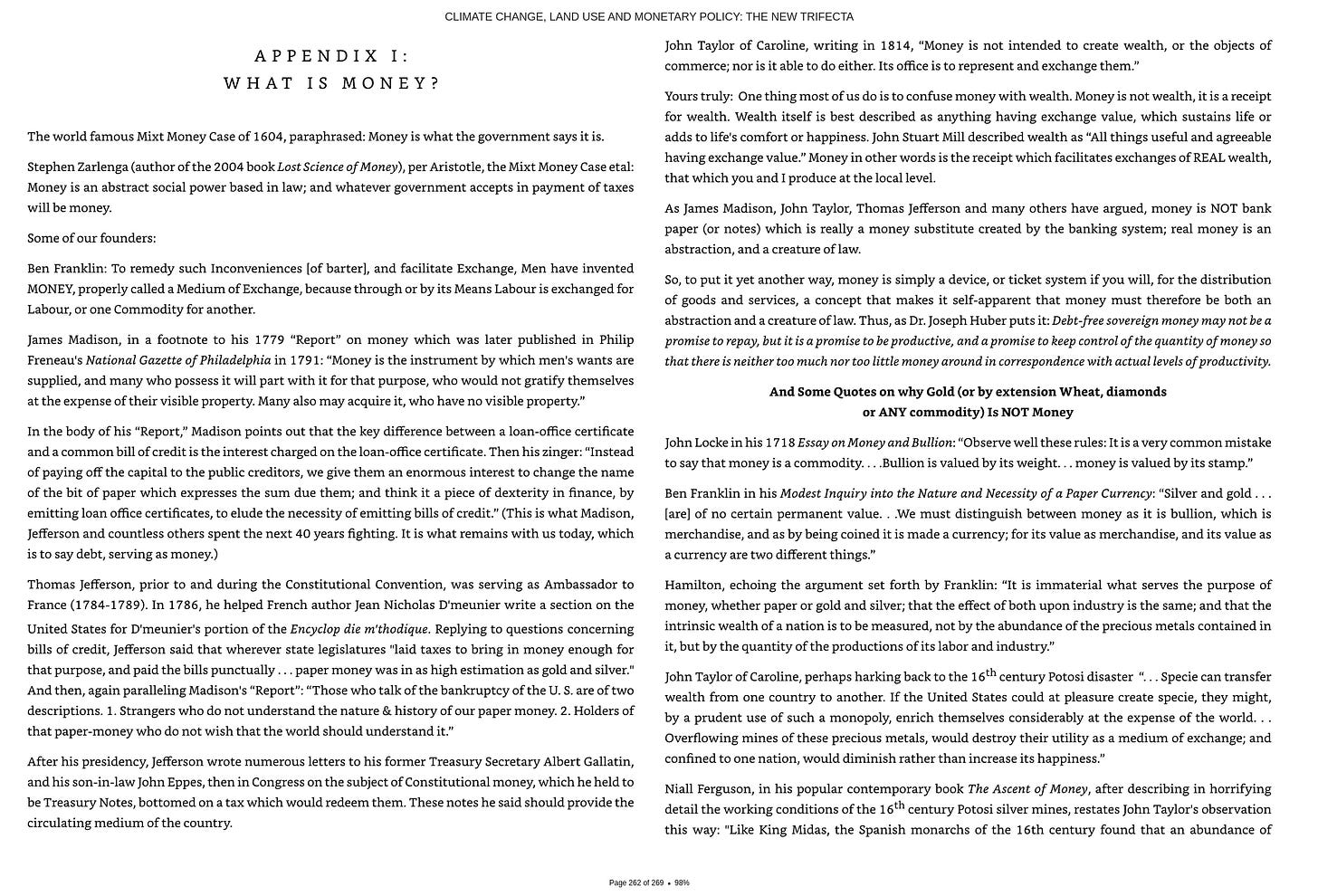

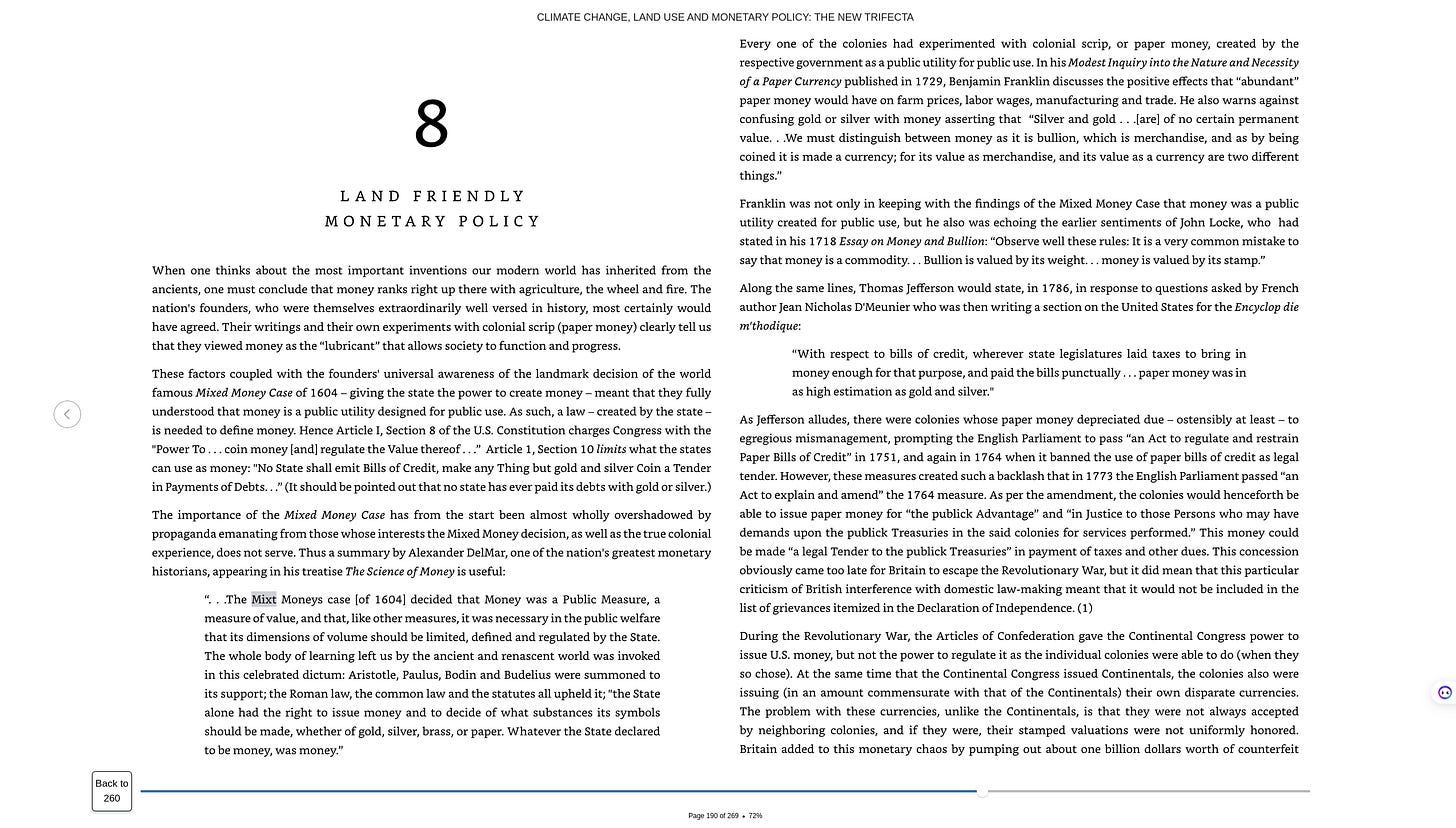
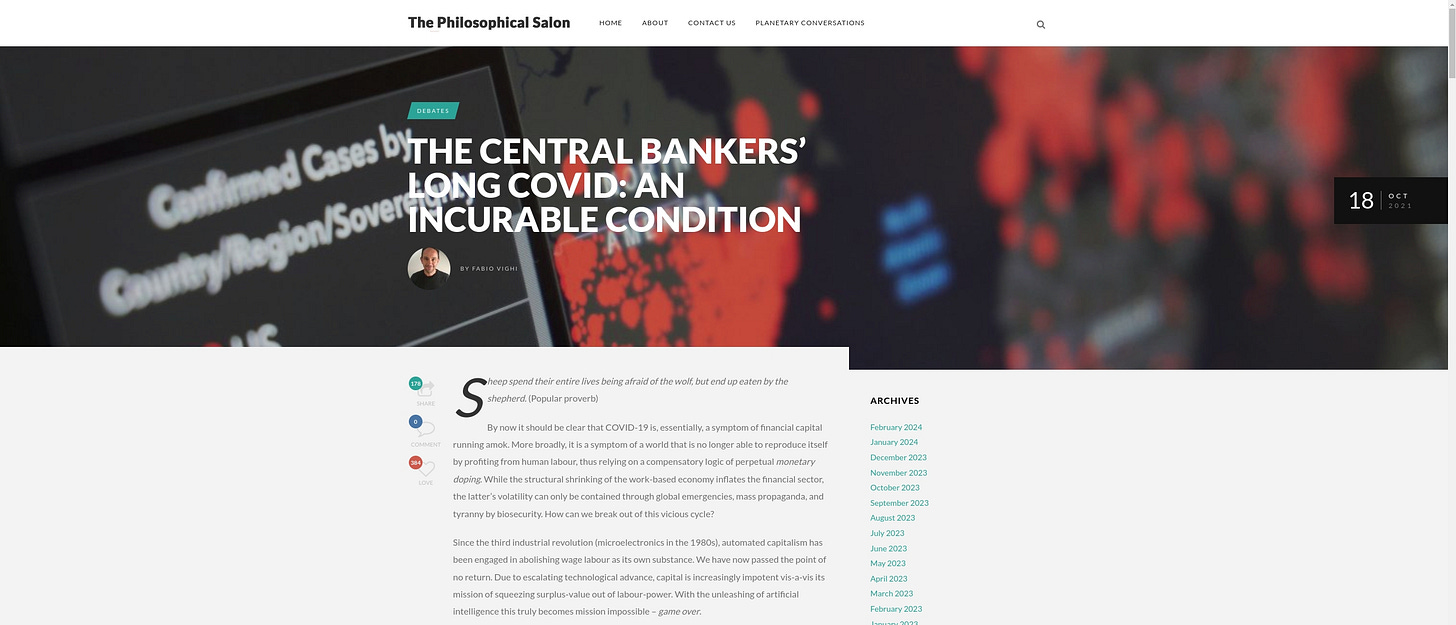
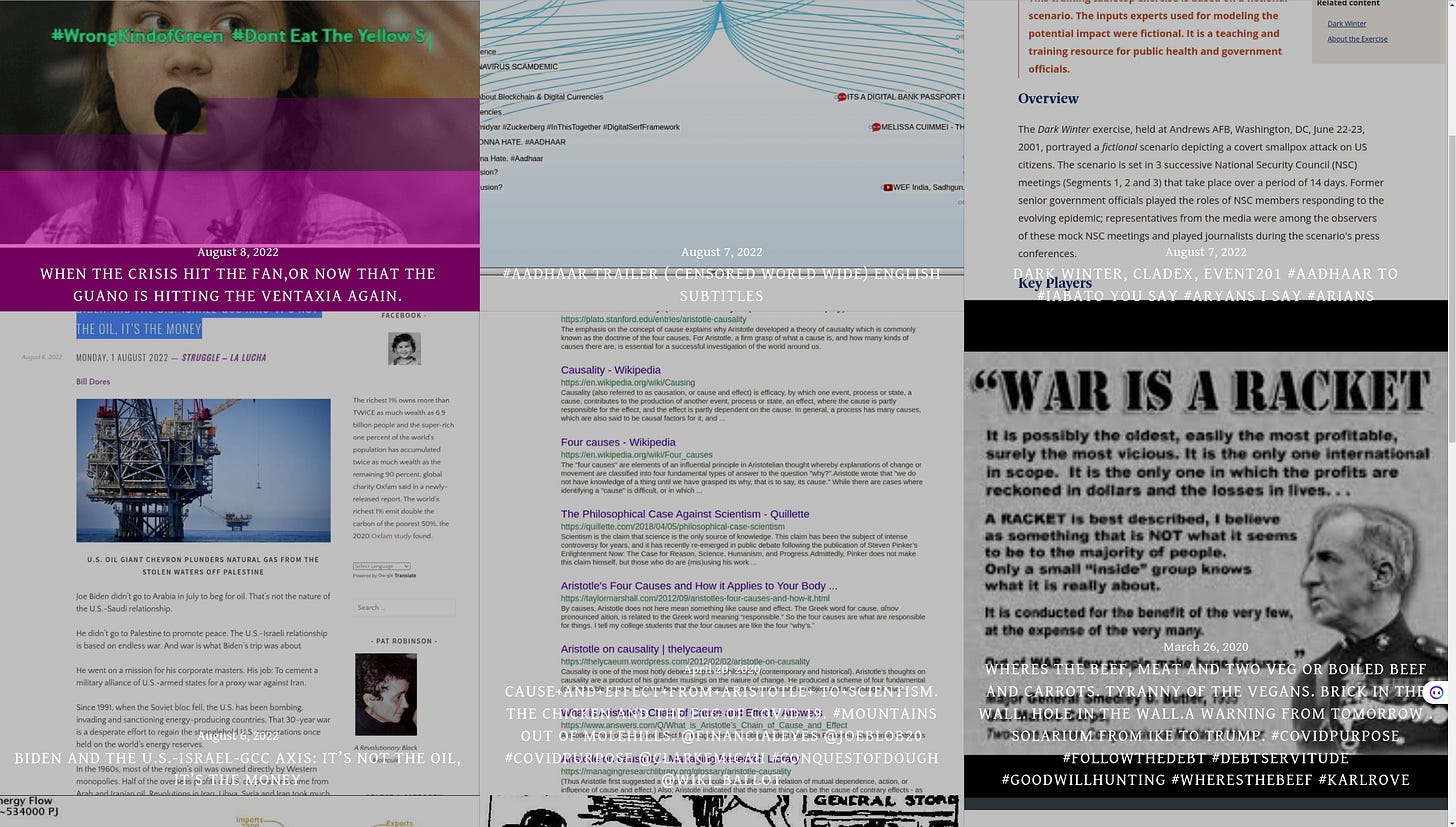


“a state of semi-permanent health emergency is preferable to a vertical market crash that would turn the memory of 2008 into a walk in the park.” September 17th 20019 #RepoSpike #GoingDirect
AUTHOR:ROGERGLEWIS PUBLISHED DATE:JANUARY 13, 2022
https://thephilosophicalsalon.com/the-central-bankers-long-covid-emergency-noise-and-conspiracys-best-kept-secret/
This is an excellent article and analysis. The driving motivation behind the accelerated rush to a Techno Fascist Feudalism has been occupying my mind for the years leading up to the Repo Spike in New York in September 2019.
In the Financialised economy and with the CBDC push tied to Digital IDs, we see a symptom of the appearance of what the system is trying to preserve, namely itself and its Monopoly ingroup. The real economy is put in the position of trying to make bricks without straw, a misallocation of resources, and the Credit tokens to acquire those resources.
The Dominant Resource that